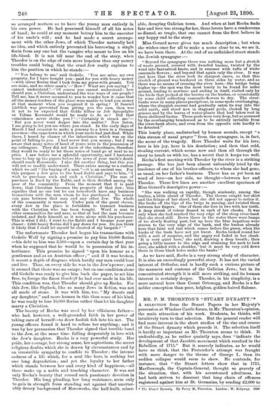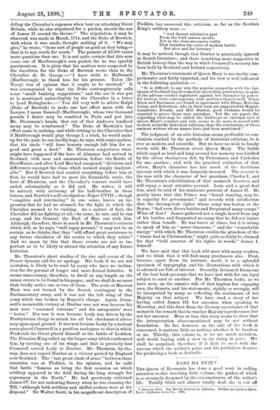MR. P. M. THORNTON'S "STUART DYNASTY." A SELECTION from the
Stuart Papers in her Majesty's possession at Windsor Castle forms, in Mr. Thornton's opinion, the main attraction of his work. Students, he thinks, will intuitively turn to that selection. But the general reader will find more interest in the short studies of the rise and course of the Stuart dynasty which precede it. The selection itself is hardly so important as Mr. Thornton seems to think. It undoubtedly, as he rather quaintly says, does "indicate the development of that Jacobite movement which resulted in the Rebellion of 1715." But it scarcely indicates, as he would have us think, that the Pretender's attempt was fraught with more danger to the throne of George I., than its sudden collapse would seem to show. He contends, for instance, that "the Stuart letters show that in 1715, Marlborough, the Captain-General, thought so gravely of the situation, that, with his accustomed adroitness, he had both striven to discount that long chain of offences registered against him at St. Germains, by sending 22,000 to
• The Stuart Dynasty. By Percy M. Thornton. London : W. Ridgway. 1850
defray the Chevalier's expenses when bent on attacking Great Britain, while he also stipulated for a pardon, should the son of James II. ascend the throne." The stipulation, it may be observed, was made in March, 1714, and the Duke of Berwick, with whom it was made, thought nothing of it. "We may give," he wrote, "those sort of people as good as they bring,— that is to say, words for words." The present of 22,000 raises more questions than one. It is not quite certain that this sum came out of Marlborough's own pocket, for he was ignobly parsimonious. It is plain that his motives were suspected by the Jacobites, for the Duke of Berwick wrote thus to the Chevalier de St. George :—" I have writt to Malbranch (Marlborough) to thank him for his present. Talon (De Torcy) was of opinion that it ought to be received." It was accompanied by what the Duke contemptuously calls some "small banking suggestions," and the use it was put to is mentioned unintelligibly by the Chevalier in a letter to Lord Bolingbroke :—" You did very well to advise Ralph (Duke of Berwick) to make one last effort more with the Lawyer, I mean Samwell (Marlborough), whose two thousand pounds I desire may be remitted to Paris and put into Mr. Dicconson's hands, that out of that Andrews landlord mony may be reimbursed." The Duke of Berwick's last effort came to nothing, and while writing to the Chevalier that if Marlborough would play George I. a trick, he would make up for the past, he can hardly hope, he says, with comic pathos, that his uncle "will have honesty enough left him for so good and great a deed." Mr. Thornton conjectures what might have happened if the hero of Almanza had arrived in Scotland, with men and ammunition, before the Battle of Sheriffmuir, and after Lord Mar had composed "divisions and differences amongst the clans which seemed simply inadjust- able." But if Berwick had carried everything before him at first, he would have had to meet his formidable uncle, the hero of Blenheim, and the Chevalier's venture would have ended substantially as it did end. He writes, it will be noticed, with acrimony of his half-brother in these letters, and Berwick's self-exculpation (Paper CVIII.), though " complete and convincing" in one sense, leaves an im- pression that he had no stomach for the fight to which the Chevalier seemed to be rushing. As a matter of fact, the Chevalier did no fighting at all,—he came, he saw, and be ran away, and his General, the Earl of Mar, ran with him. Although, therefore, there is much in Mr. Thornton's extracts which will, as he says, "well repay perusal," it may not be so certain as he thinks, that they "will afford great assistance to any • future elucidator of the events to which they relate." And we mean by this that those events are not so im- portant as to be likely to attract the attention of any future historian.
Mr. Thornton's short studies of the rise and course of the Stuart dynasty call for no apology. His book, if we are not mistaken, is likely to be read by many who have no inclina- tion for the perusal of longer and more formal histories. It seems unnecessary, therefore, to dwell at any length on the minor errors to be found in his pages ; and we shall do no more that briefly notice one or two of them. The scale at Marston Moor was not turned by the Scotch contingent in the Parliamentary army, and it was not the left wing of that army which was broken by Rupert's charge. Again, Crom- well's memorable victory at Dunbar was not won because his men were "seasoned veterans" and his antagonists' were -" levies." Nor was it won because Lesly was driven by the Presbyterian clergy to attack his all but checkmated adver- sary upon equal ground. It was won because Lesly by a tactical error placed Cromwell in a position analogous to that in which Frederick the Great placed himself at the battle of Leuthen. The Prussian King rolled up the larger army which confronted him, by turning one of its wings, and that is precisely how Cromwell served Lesly at Dunbar. Mr. Thornton, by-the- way, does not regard Dunbar as a victory gained by England over Scotland. The "last great clash of arms "between these countries was at Flodden, in his opinion, and he calls that battle "famous as being the first occasion on which artillery appeared in the field during the long struggle for supremacy in the North." He had previously criticised James IV. for not molesting Surrey when he was crossing the Till, "although both artillery and skilful archers were at his disposal." Sir Walter Scott, in his magnificent description of Flodden, has answered this criticism, so far as the Scottish King's artillery went :—
"And distant salutation past
From the loud cannon mouth, Not in the close successive rattle That breathes the voice of modern battle, But slow and far between."
It may be noticed, though, that Dunbar is practically ignored in Scotch literature ; and there is nothing more suggestive in British history than the way in which Cromwell's memory has been held by Scotland and Ireland respectively.
Mr. Thornton's treatment of Queen Mary is succinctly com- prehensive and fairly impartial, and his view is well indicated in the following quotation :—
"It is difficult to say why the popular sympathy with the fair Queen of Scotland has increased in succeeding generations, in spite of the adverse verdict registered against her character by power- ful writers, both contemporary with and later than herself. When Knox and Buchanan are found in agreement with Hume, Malcolm Laing, and Robertson, who in their turn are supported by Mignet, Lamartine, Froude, and Hill Burton, good evidence would be required to prove those men mistaken. Yet the vox populi, dis- regarding what may be called the bird's-eye or external view of Queen Mary's conduct and rule, seems to be more in accord with modern scientific historical criticism than the conclusions of those eminent writers whose names have just been mentioned."
The judgment of an able historian seems preferable to con- clusions reached by the methods of historical criticism, be it ever so modern and scientific. But we have no wish to bandy words with Mr. Thornton about Queen Mary. The battle which raged so loud and long around her memory was kindled by the odium theologicuni felt by Protestants and Catholics for one another; and with the practical extinction of that odium, Mary's character has lost much of the factitious interest with which it was formerly invested. The reverse is the case with the character of her grandson, Charles I., and Mr. Thornton's rehabilitation of that monarch deserves, and will repay, a most attentive perusal. Less, and a great deal less, must be said of his miniature portrait of James II. He gently hints that this Prince was "found wanting, may be, in capacity for government," and records with satisfaction that the incompetent cipher whose army was beaten at the Boyne, "had seen divers battles and frequented many camps." What of that ? James gathered not a single laurel from any of his battles, and frequented no camp that he did not injure rather than benefit. He was brave at times, but it is wrong to speak of him as "never timorous ; " and the "remarkable energy" with which Mr. Thornton credits the grandson of the "wisest fool in Christendom," might quite as fairly be claimed for that "bold assertor of his rights in words," James I. himself.
We have said that this book will meet with many readers, and we think that it will find many purchasers also. First, because, apart from its intrinsic merit, it is a splendid specimen of typography, and the illustrations with which it is adorned are full of interest. Secondly, because it forms one of the best book-presents that we have met with for one loyal subject to send to another. For Mr. Thornton looks, as we have seen, on the sunnier side of that hapless but engaging race, the Stuarts, and his statements, rightly or wrongly, will be interpreted by many as reflecting the sentiments of her Majesty on that subject. We have read a story of her having called James III. her ancestor, when speaking to Macaulay, and this drew from the literary executioner of that monarch the remark that he was her Majesty's predecessor, but not her ancestor. More or less, this story seems to show that the interpretation above-mentioned may be not without foundation. So far, however, as the sale of the book is concerned, it matters little or nothing whether it be baseless or no. Thirdly, this volume is, or we are much mistaken, well worth buying with a view to its rising in price. We shall be surprised, therefore, if it fails to meet with the success which the author's pains and his publishers deserve for producing a book so desirable.



































 Previous page
Previous page